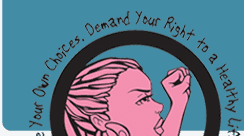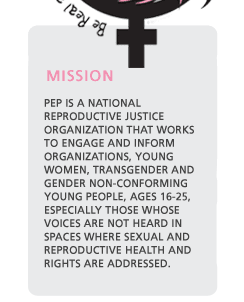It is not a coincidence that I ended up working in a movement that is fundamentally rooted in the idea that certain bodies are valuable and others are not; in a movement that is so connected with the world of healthcare and medicine - the reproductive justice movement. Reproductive justice and disability are connected on a deeply fundamental level. Disabled people, issues, history, politics and analysis allow us to see parts of reproductive justice that we would otherwise never know. After all, how can you talk about bodies without talking about disability? How can you ignore the fact that disabled women are often forcibly sterilized or given dangerous contraceptives to control their menstrual cycles for the convenience of their caretakers and institutions? How can we learn to fight for not only the right to receive care, but also the right to refuse it? How can we forget that female bodies were historically coded as �disabled� because they were �different� and had �different abilities� than male bodies? Or that ableism is so easily and successfully used as a mechanism of reproductive oppression?
As women of color, people with disabilities, LGBTI and queer people, and survivors of violence and trauma, the struggle to claim our bodies for ourselves--in all of our bodies� curious, strange, beautiful and glorious ways--cannot be separated from reproductive justice. As communities whose bodies have been owned, experimented on, institutionalized, hospitalized, medicalized, colonized, imprisoned, enslaved and controlled, we have been told that our bodies are wrong, perverse, shameful, bad, and most importantly; that our bodies are not ours; that they belong to the state, our parents, husbands, partners, doctors, children, families, communities, god(s), and so on.
I grew out of a very strong feminist, women of color, activist, close-knit community working to end violence against women and children. Early on, I learned about sexism, racism, economic injustice and homophobia; that there was no hierarchy of oppression; that systems of oppression were connected to each other, intersected and overlapped. Despite such a strong framework, no one ever taught me to think of disability in the same way and connect it to being Asian American, a woman, young or queer. No one ever taught me that being disabled was a powerful way to move through the world or that disabled communities had rich and vibrant cultures of their own.
I was taught to claim my body as a girl, female, and woman, but not as a disabled person. When it came to my disability, my parents looked to doctors, healthcare providers, medical experts and brace makers. I was not the expert on my body; they were. It never occurred to anyone that the ability to claim my body as a girl was dependent on my ability to claim my disabled body as a disabled girl. No one ever realized that my experiences with the medical industrial complex as a disabled child would ultimately discourage me from seeking medical services (reproductive or not) in the future - or that standing in my underwear in front of male doctors as they studied me was any different than standing in my underwear in front of any old men as they studied me.
Growing up disabled, my body profoundly affected how I viewed the world and in turn, how the world viewed me. School became a site where the politics of beauty, disability, race, sexuality and gender collided. I never saw disabled women (let alone disabled women of color) in powerful roles, being desired or desiring, raising families or claiming their disability as a political identity, rather than an individual flaw or tragedy.
One of my earliest memories of consciously claiming my body for myself was deciding not to wear my brace any more. For years I wore a brace on my right leg; I had to get them re-made or re-fitted almost every year as I grew out of them. I had some that went from my foot to my knee and some that went all the way up to my hip.
For a long time I did not question my brace. It was just the way things were, like stairs, people staring at me when I walked, or feeling ashamed of my disability. Among many things, my braces were hot (often made of plastic and or fiberglass), and in the Virgin Islands Caribbean weather, they itched, pinched my skin, and gave me painful blisters which I would try to prevent by wearing more socks or padding. Like my parents, I had come to believe that I �needed� to wear my brace. But something began to change as I entered middle school. I began to ask questions: why should I have to wear something so painful everyday that is supposed to �help� me? If they can send a man to the moon, then surely they can make a comfortable and useful brace for my leg? In the beginning I had small acts of resistance: the daily morning fight about putting my brace on or bringing a change of shoes and changing out of it once I was at school--this went on for years. Finally I was �allowed� to not wear my brace some days, and it was not until I was in college that I was able to choose not to wear my brace everyday.
For me, my brace represented the medical establishment�s grubby little hands on my body, forcing me to adhere to a standardized, able bodied norm of how bodies are supposed to be, look, act and move. When I wore it, I could hear horrible brace maker�s voices in my head, �that�s an ugly walk,� �walk down the hallway again and this time, try and make it prettier,� �this brace will make you have a normal walk,� or �don�t worry, you�ll be able to hide the brace under your clothes--boys won�t even know it�s there.� It represented years of someone else deciding what was best for my body and the invasion (physical and mental) of my body at a young age by people who never asked me what I thought about having multiple surgeries done at the same time; how I felt being told that my body was �wrong� and �something to fix� over and over again. All that time, I never knew that there was a whole movement out there of disabled people demanding justice and human rights.
The ownership and entitlement of the medical industrial complex of my disabled body is, in my mind, no worse than the ownership and entitlement of the system of white supremacy of my body of color; or the system of male supremacy of my female body. In fact, they are so connected and mutually interdependent that they are impossible to separate. Claiming my body has been and continues to be a pivotal process in my own life. Knowing and learning to understand my disabled body as powerful, beautiful, valuable and desirable has been central to my activism in the reproductive justice movement. For me, reproductive justice will always include a radical analysis of disability and ableist supremacy because they are part of each other and they are a part of me.
|






